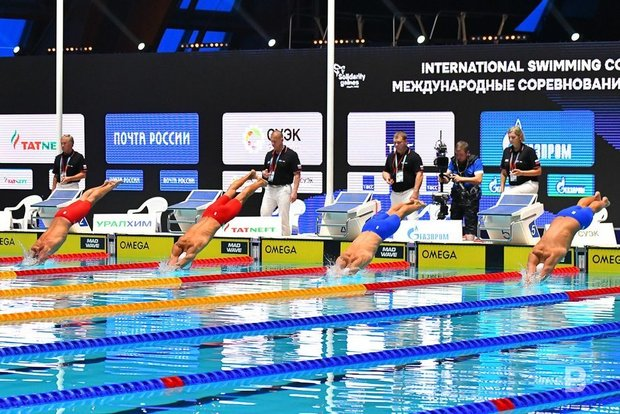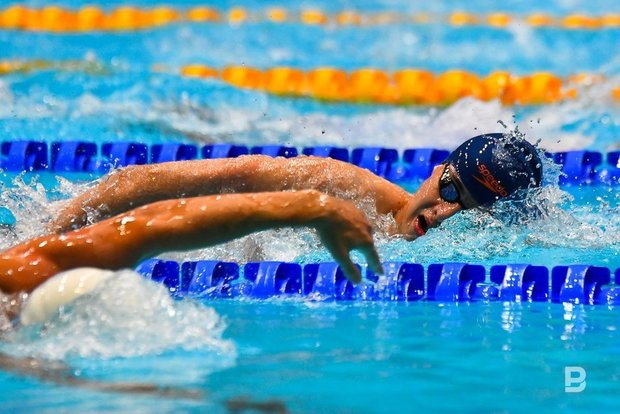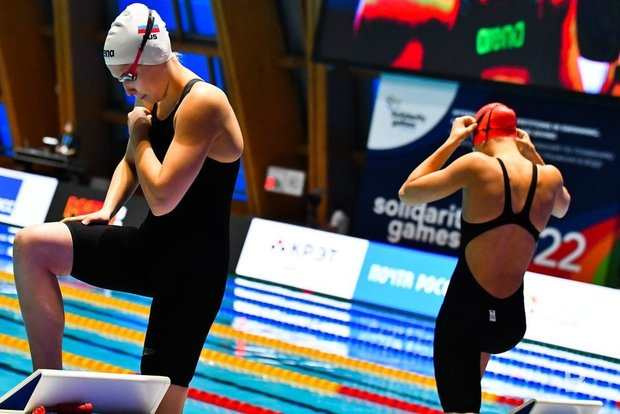Vladimir Leonov: ‘The Solidarity Games are a tournament created on the fly’
Kazan is preparing to host the Spartakiade of the Strongest this week
On 9 August, Tatarstan Sport Minister Vladimir Leonov summed up two recent international competitions — the Solidarity Games in Kazan and Children of Asia in Vladivostok — and announced the Spartakiade of the Strongest. The first competitions are scheduled on Friday — a men’s volleyball tournament at the Volleyball Centre. Realnoe Vremya’s journalist Jaudat Abdullin present key takeaways from the Tatarstan sport minister’s speech.
About Solidarity Games
Vladimir Leonov started his speech remembering about the recent competition: “We were void of a number of international competitions, some decisions had to be made to replae them, and in February-March, together with the Russian Ministry of Sport and aquatic sports federations made up a series of tournaments. This is the first tournament that was “assembled” in Russia almost on the fly. We managed to invite 16 countries, though there were 28 countries in the applications, and I am sure the number of countries will increase by the next stage. Algeria, Armenia, Belarus, Venezuela, Vietnam, Kazakhstan, Serbia, Syria, Sudan, Tajikistan, Uzbekistan, Ecuador, SAR, the DPR and LPR.
At the Games, Ilya Borodin improved the Russian 400 m record — 4:08.05. Belarusian swimmers updated three national and five junior records. Yevgenia Chikunova finished first in the 200 m breaststroke two seconds faster than American swimmer Lilly King who got a gold at the 2022 World Championship in Budapest.
I can say that that people came to the competition with pleasure — and we were even surprised with the interest, considering that it is a new product. Even more people came to the Solidarity Games than to international competitions last year. I am sure that spectators’ interest in November and December will be greater.”

About cooperation with Match TV
Also, Leonov noted that “besides the sports programme, we did a lot of sports activities (the minister meant numerous autograph signing events, master classes of Olympic champions: swimmer Yevgeny Rylov, divers Ilya Zakharov and Yevgeny Kuznetsov, synchronised swimmers Alexandra Patskevich, Svetlana Romashina, Vlada Chigiryova and Alla Shishkina). It was a joint project with Match TV subholding. According to our data, the federal channel had 40 hours of live transmissions — 12,5 million spectators watched them. They watched synchronised swimming very actively.”
Here unforgettable Anton Chekhov comes to our mind when one of his characters says: “Well, you will have to drink vodka if tea isn’t served.” Match TV turned out to have no choice like our athletes who lost international competitions. It would be strange to fill the programme with films, demonstrate old sports transmissions again, moreover, this was actively done during the coronavirus pandemic. There came a flow of domestic transmissions, moreover, such transmission of the Solidarity Games was discussed at the Petersburg International Economic Forum.

About Children of Asia
“The Tatarstan team wasn’t the most numerous, just 49 athletes in 12 sports. Our team is fifth in the medal table: 15 gold, 7 silver and 13 bronze medals. The KPI is good if we consider that the teams above us competed with more than 200 athletes. Our juniors, our reserve, Tatarstan children are the most important thing,” Leonov stressed.
It is noteworthy that 13 countries competed at the Children of Asia, almost the same number that did at the Solidarity Games, moreover, both the DPR and LPR competed at the latter. But locally, the competition in Vladivostok unlike in Kazan was limited to the Asian continent. But there are nuances here too. At the previous Children of Asia competition in Yakutsk in 2016, there were 36 countries, and now we lack 23 teams, including Azerbaijan (Armenia competed at the Children of Asia for the first time), it seems to be somehow related. In addition, there wasn’t Vietnam, Tajikistan and China, which raises serious questions. The Celestial Kingdom hasn’t yet competed in any competition in Russia, which likely counted on it. Moreover, Chinese athletes recently competed at the ICF Canoe Sprint World Championships in Halifax, Canada.
Here, of course, there are questions for the political elite too. The sports sector cannot independently establish relations in the world where there is sport and there is politics. Sadly, we have lost too much in the last 30 years. Suffice it to remember how educational institutions and sports projects created together with different countries appeared en masse in former USSR countries. For instance, Ligamus Black Sea university that opened together with Turkey was responsible for water polo in Georgia. Two football projects at once existed in Turkmenistan: International Turkmen-Turkish University and Nisa, a joint project with Lebanon. By the way, Kurban Berdyev coached Nisa before coming to Russia. And our neighbours had a myriad of such projects, but none included Russia, hi to “holy 90s” whose mistakes they are going to fix now.

Personally about Sofia Diakova
Sofia Diakova, 14, from Kazan, became almost the most mentioned athlete in Leonov’s speech for winning medals at the Solidarity Games, after that she had literally a solo at the Children of Asia in Vladivostok, while now she plans to compete at the Spartakiade of the Strongest too. Mentioning her and other medallists in swimming Leonov pays special attention, he noted that “there was some resetting, it is our starlets that will have a big journey to the future.”
We will let ourselves make a remark. Diakova competed in Kazan, then flied to Vladivostok with a huge time difference, now she is back in Central Russia to compete at the Spartakiade of the Strongest. The Tatarstan skiing team has an example with Natalia Zhukova whose intense performance before the Olympics in Sochi and further led to a situation that the 2015 WC became her last big competition. She turned 30 years in July 2022, but sports accomplishments haven’t been heard for seven years now.
Diakova is now 14, it is already clear that her talent isn’t too big for Tatarstan, it is for Russia, it is similar with, let’s say, Yulia Yefimova. But Yulia shined at the age of 15, which we wish for Diakova. The history of Soviet swimming has a humbling experience. If we remember it, Eteri Tutberidze’s group looks “nursery.” Preparing for the Olympics in Moscow in 1980, we had a swimming team consisting of school students. They won at 14 (Yulia Bogdanova), 15 (Svetlana Varganova, Larisa Gorchakova, Lina Kachyushite, Oksana Komissarova, Natalia Strunnikova), 16 (Irina Aksyonova), 17 (Elmira Vasilkova, Galina Yemelyanenko, Olga Klevakina, Yelena Kruglova), but none of them remained in swimming at the age of 20. If we take Diakova to the senior competition, with such trips across the country, with time difference, it is extremely doubtful “resetting.”
Poverty of “queen of sport”
Colleagues mentioned the issue of Tatarstan athletics at the briefing. 10 years ago, we had medals of all calibres at the Olympics, and now there is one medal at the youth championship in Kazan, two medals in last year’s Russian Championship nobody even talks about but complain about the failure of the “queen of sport.”
If finance and possibilities in the organisation of training in badminton, swimming and skeet shooting in the republic allow inviting athletes to team Tatarstan, in weightlifting we actively use the capabilities of Kazan Olympic Reserve College (earlier Okulov, Khomyakov, now Abkhaz Elkan Gvazava), the Volga sports university comes to rescue in artistic gymnastics (Melek Sak), there is total darkness in professional sport whereas amateur athletics is blossoming. And now there is hope that long-distance runners Kashapov, Kiselyov, Yadgarov will win a medal, but... Meanwhile, at the Commonwealth Games in English Birmingham, two Hindus Eldhus Paul and Abdulla Abubaker won gold and silver in triple jump, Murali Sreeshankar has silver in long jump. At the World Junior Championship, Selva Terumaran has silver. Coaches from Cuba, Russia who even didn’t get visa for the competition in England started to work with Hindus. Nevertheless, their athletes won three out of six meals. Pauls and Abubaker are Kazan-born Denis Kapustin’s athletes, he also worked with Sreeshankar. Paul already finished at the World Championship ninth and would have been only seventh with the current result. But he would have won the recent Russian Cup in Bryansk with a big margin.
The Spartakiade of the Strongest Realnoe Vremya will dedicate a separate piece should not only provide athletes a chance to substitute the international competitions Russia was taken away but also reveal training problems on the spot. Also, for instance, in the USSR, the last three Spartakiades started to be held as youth competitions, which immediately demonstrates who was who. When Tataria didn’t have such a big number of sports venues, didn’t have a competitive advantage related to specialised educational institutions as the Kazan Olympic Reserve College or the sports university and had to get by on its own. However, there wasn’t an obvious leaning in team sports as it is happening now. The example of same Sofia Diakova demonstrates that one athlete can bring three golds in competitions, and it is both cheaper and more significant than, for instance, three teams in the first league.
Reference
The author’s opinion does not necessarily coincide with the position of Realnoe Vremya’s editorial board.